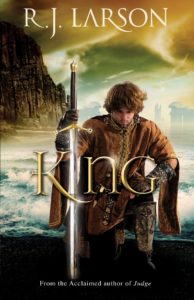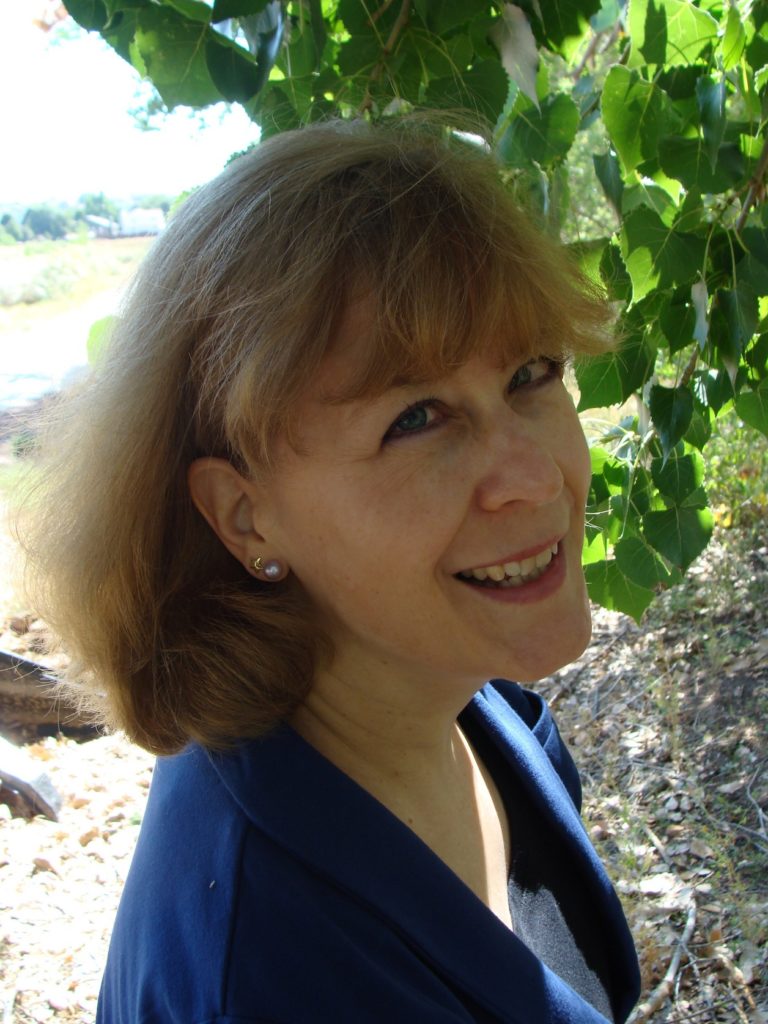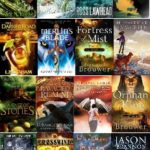Do The Scriptures Work In Fantasy Realms?
 R. J. Larson is the author of numerous devotionals and is suspected of eating chocolate and potato chips for lunch while writing. She lurks online at Facebook
R. J. Larson is the author of numerous devotionals and is suspected of eating chocolate and potato chips for lunch while writing. She lurks online at Facebook
R. J. lives in Colorado with her husband and their two sons. The Books of the Infinite series marks her debut in the fantasy genre.
– – – –
When the inspiration for Prophet [finalist in the 2013 Clive Staples Award] first hit me in early 2010, I dismissed it almost immediately. How could I possibly trust an idea that had emerged in a dream-fragment? Presenting beloved storylines from the scriptures in a fantasy realm seemed, well, delusional.
After I drank my coffee, however, I was forced to reconsider my initial decision. The dark-haired girl I’d glimpsed in my dream now had a name—Ela—and her storyline was unfolding even as I tried to ignore it altogether.
Ela had been called to serve as her Creator’s prophet—her world’s first female prophet—knowing that she’d die young. Knowing that she couldn’t live without Him.
I had to admit that I was intrigued by the idea, but harbored doubts. Would the Lord’s Word carry weight with readers in a fantasy realm? What about the theological quandary—if the Messiah died only once for all our sins forever, which included every sin in the entire universe, how could I possibly portray another world compiling its own Bible to honor our Creator? Didn’t Israel stone scribes for such offenses in ancient times?
Ignoring the storyline for three weeks didn’t help in the least. I emailed my agent, begged her forgiveness for abandoning my work in progress, and told her that I had to write this story before it drove me insane. When she graciously agreed to present Prophet to publishers, I sat down and wrote a record three chapters that week.
With each chapter I prayed. Whenever I was compelled to write dialogue between Ela and her beloved Creator, the Infinite, I prayed and studied the scriptures for reassurance. What had the Lord said to His prophets in similar situations on planet Earth? Could I merge storylines to create fresh other-world scenarios, yet remain faithful to the Word?
 For sixteen months, I worked on Ela’s story, presenting her world and its Books of the Infinite, in Prophet, then Judge, and King. By the time I wrote the last line in King, I had my answers.
For sixteen months, I worked on Ela’s story, presenting her world and its Books of the Infinite, in Prophet, then Judge, and King. By the time I wrote the last line in King, I had my answers.
Presenting the Scriptures in a fantasy realm allowed readers to view our beloved Bible through new eyes, and many have written letters to share their feelings after reading the series. Yes, the Messiah had truly died only once for all sins forever, yet my main characters were able to honor His promise and look forward to their future as followers of the Infinite.
And, no . . . stoning hasn’t yet been mentioned.
Above all, I was astounded at how easily the Lord’s living verses could be woven together in a different realm with its own history. Because our Creator is unchanging, and His Word is eternal and alive, the Scriptures translate beautifully into other realms.
The story continues . . .









































I don’t understand what she means when she says
What about the theological quandary—if the Messiah died only once for all our sins forever, which included every sin in the entire universe, how could I possibly portray another world compiling its own Bible to honor our Creator? Didn’t Israel stone scribes for such offenses in ancient times?
She means, “Won’t my fellow Christians in modern times stone me?”
But where is she going when she’s saying there is a “theological quandary”? My first thought is, “Why wouldn’t the Bible be different on a different world?” It’s the expression of Christ “pitching His tent” among us. If He pitched his tent among those in alternate earth, wouldn’t it look different? On the other hand, certainly the Bible didn’t change as we passed through different eras in our history. In a sense, the Bible wasn’t rewritten every time a new group of people came along. Though different emphases came to the fore and revelation of what was there all along brought into being new understandings (for example, Luther and the excesses of his day, etc.) Is that what she means? That because we consider the Bible as a closed cannon, there is no room for more revelation?
I thought I might have my answer if I wrote this down, but I don’t think I do yet.
Help!
I don’t think it has anything to do with new revelation. I believe she’s just talking about the quandary of whether it’s appropriate to use the words of God in a fictional setting, “putting words in His mouth” in regards to imaginary situations and people.
Hi, Matthias!
I’m a big fan of fantasy, but I’ve heard Christians speak against portraying the scriptures in other realms because other planets aren’t “descended from Adam”, nor are they sons of Abraham, therefore the Lord’s sacrifice on the cross is reserved only for Earth. Therefore, the argument goes, how could fiction set on another planet properly and accurately portray the Lord’s death?
In other words, realistically, the Lord’s sacrifice cannot be accurately described and depicted in fantasy realms, because He died only once, on Earth.
It’s an interesting topic!
However, because–as HG noted, “Truth is truth.”
And Truth is universal, so I prayed and followed the story, striving to honor the scriptures and the Lord with each word.
Blessings!
R. J.
I’m reading your first book right now, and I completely agree that “Because our Creator is unchanging, and His Word is eternal and alive, the Scriptures translate beautifully into other realms.”
It works so well in your story. “Prophet” is the best example I’ve ever seen of using Scripture within fantasy fiction. It works, and it’s beautiful, and I have been inspired and drawn closer to God as I read it. I love it when a fantasy helps me see God through new eyes. Thank you for writing this book! 🙂
I’m still in the middle of it, but I’m excited to see where it goes and to read “Judge” and “King”!
Bethany, thanks!
I’m so glad you enjoyed the stories! I’ve loved writing this series, and it’s been fascinating to see the Scriptures through new eyes, so to speak. It’s also been a privilege to portray (to a tiny t-i-n-y extent) the Lord’s overwhelming love for us.
Although this was in a SF context, one of the best moments in the film ENEMY MINE is when Davidge is under the tutelage of Jeriba re the Drac scripture, the words of Shizmaa’aa (sp?) the Great Teacher called the Talman (sp?), and recites what amounts to the Golden Rule using different words but the same notion. Davidge remarks that he’s read that before, in the “human Talman.” “Of course you have,” Jeriba responds. “Truth is truth!” The “aliens” in the universe of this film had their own revelation of God, their own relationship with God, and their own very Word of God — for them. In principle this does not violate the Words of the Jesus we know — on the contrary, it’s the same Word, the same Logos or message, because He is the same God. As long as writing remains true to what God has told us, I do not see the problem. And if someone’s God isn’t big enough to handle aliens and other realms, then he’s quite small indeed.
HG, I’m now searching for ENEMY MINE online–I haven’t seen it, and I must, now that I’ve read your comments. Thank you! My guys will enjoy this one.
While I’ve only read a few speculative works–Christian or otherwise–with ‘scriptures,’ I think that prayerfully considering what God’s character is and starting from there is much better than tweeking a few Bible verses or dropping them in wholesale. That completely breaks the suspension of belief.
Thanks, Julie!
Yes, I agree! I was so intimidated by the process–I still am.
Yet, again, because the Lord doesn’t change, I was able to draw from His words in the Bible for the Books of the Infinite.
I believe that the faith aspect of any work of fiction must be organic to the characters and the situation, or realm. Readers must perceive faith as something that the characters live with and grapple with in their day-to-day existence.
Verse-dropping… *Shudder!*
Apologies, everyone! I didn’t realize this post had been published–mixed up the dates and lost track of time due to an insane schedule! Rebecca, thank you for all your hard work–you’re amazing.
Hmmm. I am curious, too, and just searched my Kindle for Enemy Mine. Can be rented or purchased from Amazon. Can also watch a trailer of the movie. Perhaps I will rent it after I finish the current book I’m reading. ☺